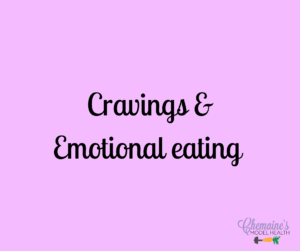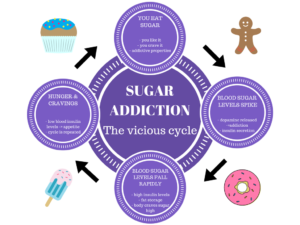Cravings and Emotional eating
 I wanted to compile a few of the posts I did on cravings and emotional eating on my Facebook page, in one place so I could direct my clients and followers to one place of reading, I really hope you all find this somewhat helpful and put some of the tools herein into practice!
I wanted to compile a few of the posts I did on cravings and emotional eating on my Facebook page, in one place so I could direct my clients and followers to one place of reading, I really hope you all find this somewhat helpful and put some of the tools herein into practice!
There’s an aspect of health and fat loss that gets missed most of the time… ‘emotions’.
Most women experience emotional eating, men not so much, it’s a female thing unfortunately. Women are emotional beings, we are nurtures, we are care givers, we are feeders. We feed babies when they are born, when they cry it’s usually because of hunger so it’s natural to us to associate food with emotions right?!
So then when a woman is particularly unhappy, depressed and not satisfied in her life – she is more likely to turn towards food to make herself feel better or as a way to avoid negative emotions, than a man would.
 Lets first look at the biochemical reactions that take place when we experience cravings… it usually goes a little like this 🧐
Lets first look at the biochemical reactions that take place when we experience cravings… it usually goes a little like this 🧐
Eat sugar -> spike insulin -> insulin and blood sugar drops -> sugar cravings increase in aims to bring insulin back up.
When we are stressed it looks a little like this;
Stress -> spikes cortisol and adrenaline -> causes the body to look for serotonin and dopamine to feel good and safe again -> sugar increases dopamine production making us feel good for a while. When the hormones drop, the cycle begins all over again, starting with increased cravings.
What about sleep?
Poor sleep -> reduces available energy causing the brain to stress and malfunction -> the brain send out a signal to look for the fastest most easily absorbed form of fuel… sugar.
Seems pretty obvious but most people when they have uncontrollable eating or cravings don’t stop to reflect on what’s going on inside them or what’s driving this. So let’s look again… what are some more things that drive up cravings and emotional eating 🍽
– poor sleep
– late night eating
– eating sugar
– eating junk food
– dehydration
– nutrient deficiencies
– stress
– overwhelm/multitasking (having too much to do)
– feelings of sadness or upset
– alcohol
– loneliness
– relationships
– work
– kids
– low self esteem
– health concerns
– food (being unprepared with food or feeling guilty) ☹️
That leads us to the ’emotional level’.
It has been recognized that there are certain feelings or emotions that connect to cravings of certain foods, being aware of this can help you understand your cravings better and better deal with your emotions.
They are as follows;
- crunchy snacks like crisps and crackers can connect to chronic underlying anger issues
- cravings for high-fat food stemmed from chronic fear, tension, anxiety and depression
- ice cream ‘soothes’ depression with its creamy texture
- the number one food craving, chocolate, contains the same chemical the brain creates when we feel romantic love, meaning women in particular may crave chocolate because it creates the feeling of being loved. Chocoholism may be a cry for love, intimacy and romance. It’s the perfect antidepressant for the lovesick.
- burnout or fatigue from pushing yourself too hard might cause you to crave the stimulating effect of red meat or sharp cheese
- loneliness, stress and emotional distress drive cravings or the want for alcohol
- chewy or crunchy foods like cookies, M&M’S and crackers can also signify stress or frustration
- feelings of loneliness, emptiness or sadness can cause cravings of pasta and pizza 🍕
Studies suggest every food corresponds to a certain mood or emotion. In 1982 the American university professor Bernard Lyman asked 200 people to imagine themselves experiencing various emotions, including anger, loneliness and joy, and at the same time asked them what food they’d like to eat.
They indicated strong preferences for desserts when feeling happy and loving, but when anxious they wanted snack foods, both of the healthy and junk variety.
Each food is craved because it has amino acids, neurochemical catalysts, or vasoconstriction catalysts, which will energize your body or soothe your brain chemicals, making you feel better ‘for a short time’.
How to assess your sugar or junk food cravings.
We crave sugar for three reasons:
1️⃣ When we need more motivation/dopamine/
2️⃣ When we have depleted our energy sources
3️⃣ When we feel stressed or unsafe.
So next time you reach for a cookie or chips – check in and ask yourself:
- How have I managed my food/energy levels today?
- Am I craving sugar because I’m hungry?
- How stressed have I been this week?
- Have I done anything to help myself mange my stress?
- Am I using sugar to help me cope?
- Has my self-esteem been affected by something today?
- What can I do that would leave me feeling rewarded/accomplished/
motivated? - Is sugar replacing the reward of achieving something?
- Am I happy?
- What is making my heart ache? When you feel a binge or craving or bout of emotional eating come on – stop and take a moment to focus on these questions. Focus on deep breathing, quiet your thoughts and become present in what’s going on. Then figure out what else you could do to distract yourself and make yourself feel better;
Go for a walk
Massage essential oils on your temple and neck
Foam roll
Practice some yoga poses
Call a friend
Or whatever it is that doesn’t involve food. 🙂Changing this pattern in your brain allows you to connect new brain neurons and create new habits and skills for times of struggle that benefit you rather than making you feel worse.
There is a neurological, biological, and emotional basis under our cravings.
There are also some nutrient and mineral deficiencies that have been connected to emotional eating….
They are;
– Magnesium
– Zinc
– Iron
– Calcium
– Sodium
– B12 and B6
These vitamins have also been associated with feelings of sadness, anxiety and shaking or tremors.
So staying on top of our bodies nutrient needs is going to benefit us on many levels but also help us manage cravings and emotions a bit better.
This post was compiled to help you reflect on what might be driving your cravings and emotional eating. I hope you find it somewhat helpful. One book that I highly recommend if you want to delve more into the world of emotional eating is “Constant cravings” by Doreen Virtue. Its a good read that gives lots of insight into why we may be craving a certain food. 🙂
